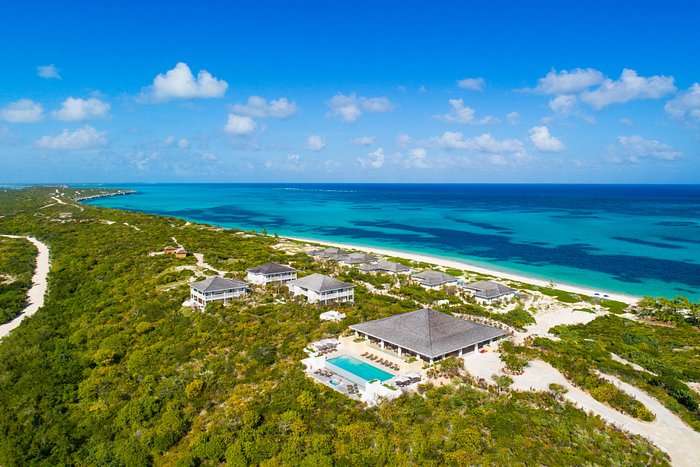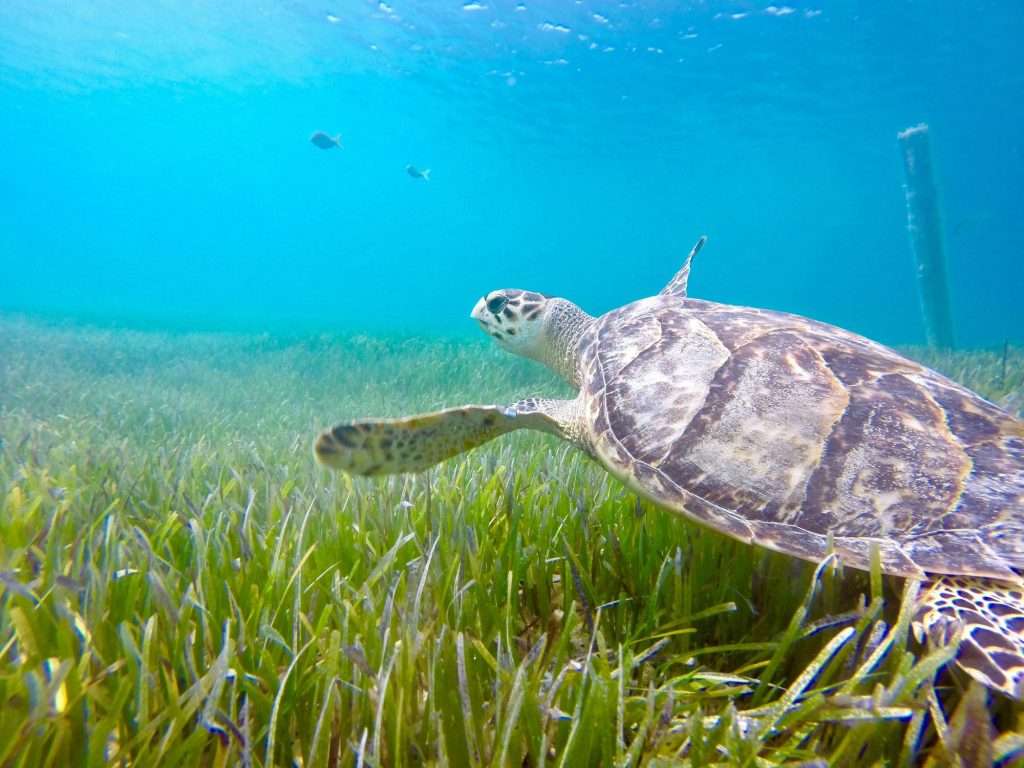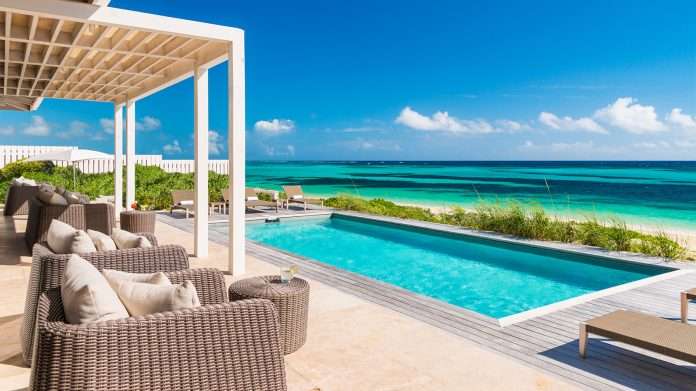Turks and Caicos Islands are about as serene a getaway as it gets for those seeking tranquility and luxury in the Caribbean. And it’s now becoming home to responsible luxury and conservation efforts, too.
Last December, the beloved Sailrock South Caicos, acclaimed for its exceptional service and pristine beauty, was named the 2023 Resort Hotel of the Year by Small Luxury Hotels of the World (SLH). It was the second year in a row the resort earned the title, after ending a six-year winning streak for Zaya Nurai Island in Abu, Dhabi in 2022.
“Sailrock South Caicos proudly represents the quintessence of the Caribbean, offering an unparalleled experience of natural beauty and timeless luxury,” Kashmie Ali, Vice President of Sales and Marketing, Sailrock South Caicos, said in a statement accompanying the announcement last December. “Being named the World’s Leading Luxury Villa Resort for the second successive year is a testament to our team’s unwavering commitment to service, hospitality, and excellence. We are honored to receive this prestigious recognition and remain committed to exceeding our guests’ expectations.”

It’s easy to see why the destination nabbed the award two years in a row. The 750-acre Caribbean resort is located between the Caicos Bank and the Atlantic Ocean, offering guests stunning vistas, rich coral reefs, and pristine turquoise waters from its 35 luxury villas that overlook the two coastlines. The resort offers an array of luxurious vacation homes, including private estate villas, beachfront villas, and resort suites. The SLH Resort Hotel of the Year title emphasizes the resort’s dedication to five-star hospitality, exceptional brand management, and boutique experiences. But the recognition also symbolizes a region-wide shift happening at the luxury vacation destination.
Turks and Caicos: a biodiversity hotspot
A big part of the allure of South Caicos is its richness of experiences such as snorkeling in the clear, blue waters, encountering wild donkeys by the roadside, and marveling at the star-filled night sky. The small island, covering only 8.2 square miles, is home to fewer than 1,600 people. But the Turks and Caicos Islands (TCI) as a whole are at a critical juncture, with their rich marine biodiversity and the local economy at risk due to lagging conservation efforts. The challenge is substantial: to enhance marine and coastal conservation practices that have fallen behind, endangering the ecosystem that underpins the area’s ecotourism and the livelihood of its residents. With diminished governmental support, the emphasis on bolstering collaborations among community groups and nonprofit organizations has never been more critical. Without significant action, the sustainability of TCI’s coral reefs, a key attraction for visitors worldwide, is in jeopardy.
The Turks and Caicos government, alongside its new destination marketing organization Experience Turks and Caicos, underscores that it is dedicated to a comprehensive approach that emphasizes environmental preservation and equitable prosperity. However, there have been calls to increase funding and enforce existing environmental laws more strictly. The marine life that calls TCI home, including whales, dolphins, and stingrays, plays a crucial role in the tourism sector and the islands’ economic health. The future strategy involves backing research initiatives and education programs that advocate for responsible interaction with these species.

Particularly at risk are the reefs around Grand Turk and South Caicos, threatened by the increasing presence of private yachts, which can cause damage through anchoring and navigational mishaps. Conservationists say implementing penalties for environmental infractions, such as oil spills or the accidental discharge of grey water, could help. So could efforts to engage with local fishermen and tour operators to underscore the importance of sustainable practices is essential for the protection of marine life. There are also calls to engage younger generations, whose education in environmental stewardship can foster a shift in the community’s approach. Moreover, improvements in infrastructure, such as the installation of boat moorings and channel markers, are crucial to preventing further ecological damage.
The broader implications of neglecting marine ecosystems, especially in the context of climate change, are dire. Coastal communities around the globe are most at risk from rising sea levels and warming ocean temperatures that can erode coral reefs and impact other marine life. Ed Forbes, a native of the Turks and Caicos Islands, emphasized the urgency of the situation in a recent op-ed. “We must collectively embrace the responsibility to protect and preserve our environment. The time for debate is over; the time for decisive action is now,” he said, noting it’s a rallying cry not just for policymakers but for everyone who cherishes the beauty of TCI.
Responsible tourism in Turks and Caicos
A pivotal element in enhancing connectivity within Turks and Caicos is the improvement of transportation infrastructure. Plans for a new “first in class” airport terminal and upgraded port facilities are underway, alongside the anticipated South Caicos Airport upgrade, which will facilitate international and regional travel directly to South Caicos. Enhanced accessibility is now assured with direct flights from the U.K., alongside existing services from major U.S. cities and Canada, via airlines such as American, United, JetBlue, Southwest, Delta, Air Canada, and Westjet. Direct flights considerably reduce emissions as a large part of a plane’s fuel consumption occurs during take-off and landing.

But the brunt of the burden falls to the region’s hotels, which are both part of the problem and solution; the influx of travelers to the destinations puts pressure on the region’s ecosystems and resources. But, as emergent leaders in responsible tourism, with a forward-thinking strategy focused on sustainable development across its islands, the resorts can have significant impacts on sustainability metrics and conservation efforts, not unlike the resorts of The Maldives, where marine biologists are on staff and conservation-focused activities are highlighted for guests. For the TCI, the plan includes the introduction of new luxury accommodations and efforts to disperse tourism benefits throughout less-visited areas like Grand Turk, North and Middle Caicos, South Caicos, and Salt Cay.
Luxury resorts like Sailrock South Caicos are helping to elevate the region prized for its proximity to such a rich diversity of marine life. Andaz Turks and Caicos at Grace Bay in Providenciales, scheduled to open in 2025, is also expected to boost responsible tourism efforts in the region. Similarly, Salterra Resort and Spa, which is set to open in South Caicos in the fall 2024, promises to attract more visitors who value conservation efforts and sustainable travel. This shift in focus was highlighted recently by Josephine Connolly, Minister of Tourism, during the Caribbean Tourism Organization’s State of the Industry Conference. “In essence, it is a pivot to a more people — and environment-centered approach where the dividends of prosperity are shared by all stakeholders,” she said, emphasizing the commitment to preserving the islands’ natural allure for future generations.
Premier Washington Misick echoed this sentiment. “The ambition for Turks and Caicos is huge,” he said, underlining the Caribbean’s esteemed status in the global tourism market and the intention to fulfill these expectations with high-quality developments and services. The recent spotlight on the region and the increased efforts to protect the islands suggest more is on the way. “The Caribbean is naturally inspiring,” Misick said. “The global market and tourism considers the Caribbean as a premium destination with a proven track record.”
Related on Ethos:


